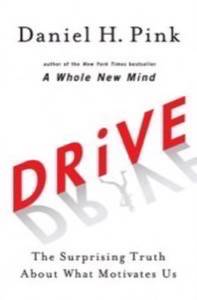The businesses of the 21st century are rapidly evolving to incorporate radical new methods of running a business and managing employees, and no group knows this better than the startup community. Startups have been at the cutting edge of innovation not only in the products they create, but in the way they run their companies and treat their workers. In this week’s Weekend Reading selection, we look into how years of scientific research has uncovered what motivates people to be outstanding employees and how successful companies are incorporating these methods.

This week’s book, Drive: The Surprising Truth About What Motivates Us, by author Daniel Pink, attempts to uproot traditional business incentive models and teach us how we can be better motivated to produce amazing work. As Pink discusses in the book, humans are biologically wired to specific factors that can help them be more productive: autonomy, mastery and purpose.
Autonomy is our desire to direct our lives in the direction we want, instead of being told what to do, or where to go. When we choose to do tasks on our own, our ability to complete them in a timely and skillful manner skyrockets. Pink spoke earlier this year at the Royal Society for the encouragement of Arts, Manufactures and Commerce (RSA) in London (see video below) where he went over some of the lessons in his book. Software company Atlassian, he says, gives employees a day each week to work on whatever they want with whoever they want – an experiment that often produces bug fixes and innovative ideas that would have otherwise never been.

Humans also have an urge to learn new things and master new skills. As Pink puts it, our urge for mastery is the same reason why some people play a musical instrument on weekends. The same applies to the millions of people who contribute to open source software projects, like Linux, Apache and Wikipedia. People get satisfaction when a challenge is met with mastery, and the results are at a much higher quality level than those produced by less motivated individuals. Combine these factors with a purpose, and Pink says you have a recipe for success.
In his book, Pink dissects scientific studies that show how monetary incentives will often work contrary to how businesses want them to. When a task involves anything beyond purely mechanical skill, incentivizing higher performance actually produces worse results. We mentioned this a few weeks ago with Tom Wujec and the marshmallow challenge where teams building structures of spaghetti and tape performed worse with higher cash incentives. As Pink puts it the “carrot and stick” approach to motivation doesn’t work to solve the problems companies face today.
Larger businesses move slowly, and smaller ones, like startups, are more agile and can institute change more quickly. Because of this, startups, with their smaller teams and greater acceptance of radical thinking, are more likely to benefit from the lessons Pink spells out in Drive. It’s no mystery why when we are given a behind the scenes look at some of the world’s most successful businesses that we find unique and innovative business practices motivating employees to produce amazing work. Entrepreneurs should look into this book and see how they can install a more friendly atmosphere of motivation early on in their young companies.

















